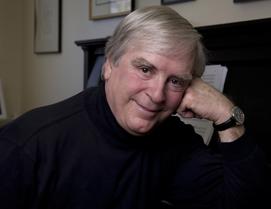by the Rev. Calvin Sanborn
Rector of St. George’s Episcopal Church, York Harbor, Maine
[Ed. Note: The Rev. Calvin Sanborn was invited to share his reaction to the Orlando shooting at a gathering earlier this week at Maine Street, a gay nightclub in Ogunquit. Pretty sure it’s where Jesus would have turned up.]

The Rev. Calvin Sanborn, center, marches with other Maine Episcopalians and hundreds from across the Church at a march against gun violence in Salt Lake City last year during the Episcopal Churches General Convention.
Let me begin by expressing my gratitude to Jimmie, Eddie and Normand for organizing this event. As we struggle with myriad emotions in the wake of the horrific and terrifying act of hatred toward the lesbian, gay, bisexual and transgender community in Orlando over the weekend, it is SO good to be together. Thank you!
I learned about the shooting in Orlando as I was just about to begin my first service at St. George’s in York last Sunday. A beloved member of the congregation who has a gay brother in Orlando shared the news with me.
My gut immediately clenched, and my heart began to ache. It was difficult to absorb the words. I had to begin the service, so I did my best to maintain my composure, succeeding up until it was time to lead the congregation in prayer. At that moment I found myself unable to speak.
Through tears I could no longer hold back, after a few moments, I managed to choke the words out.
As a priest and a person of faith, of course, prayer is meaningful and important to me, but I’m not here tonight just because I’m a priest. I’m also here because I’m a gay man. I’m here because I know why an attack on a gay night club is so uniquely painful to the lgbtq community, our community.
I’m blessed be a part of a faith community where I’m not expected to hide or be silent or afraid. In my tradition I’m reminded on a daily basis that I’m imperfect, yes, but beautiful and beloved and holy in the eyes of God as is every single person here.
In the past few days, memories of my own nights in my early 20s spent with my friend Stephanie going out to clubs in the greater Boston area have been flooding my mind. I was there to dance, to celebrate, to feel joy. I was there to be surrounded by people like myself and to know that I was safe in the company of people who understood me in a way that other people did not.
I didn’t grow up in a community where I could count on that. I grew up in a small town in rural Maine. While my friends and family there loved me, I knew that love required me to keep parts of myself hidden. Thankfully, that’s no longer the case, but in my 20s it was, and, in those clubs, I didn’t have to hide.
As we honor the memory of the 49 people who were brutally murdered in their own safe space, I think it’s important to remember that they were not only lgbtq people, but also people of color. Several news reports have noted that many were from families who came to know their child’s sexual identity only because of this tragedy. Many of them may have been at Pulse because they, too, needed a place where they didn’t have to hide.
As we contend with our grief and our hurt and our fear and as we rally our strength and our pride for action, it is vital that we resist any and all attempts to erase or deny reality. This crime was a hate crime. I refuse to let that fact be ignored. These murders were of lgbtq people and their loved ones because they were lgbtq, and that is damn scary!
And that’s when I come back to being a priest in the Episcopal Church. I recognize that my faith and my traditions may not be shared by everyone in this place, and I completely respect and honor that. But I feel that there are parts of my faith, and yours too, that have meaning for us all. I’m blessed be a part of a faith community where I’m not expected to hide or be silent or afraid. In my tradition I’m reminded on a daily basis that I’m imperfect, yes, but beautiful and beloved and holy in the eyes of God as is every single person here.
And I follow the teachings of Jesus, a man who reminded his followers over and over and over again, “Do not be afraid.”
Do not be afraid. I say those words to you now.
We must not be afraid. We must not be silent. We must stand up. We must be proud.
We must NOT let this act of hatred cause us to shrink back into the shadows. We must not let fear become another closet. We must let the power that is in us and within our community well up and revive our commitment to seek justice, to be advocates for every person in this world who is being told that they are worthless, and to demand that safety and security are basic human rights.
We must honor the 49 lives lost in Orlando, and in so many other mass murders that have occurred in our country, by using our voices to support our leaders who value women, children, black people, latino people, gay people and transgender people. And we must help pass legislation to change our gun laws. Assault weapons do not belong on the streets.
And we must keep on dancing, keep on celebrating who we are, and keep on marching. We must never lose our pride!

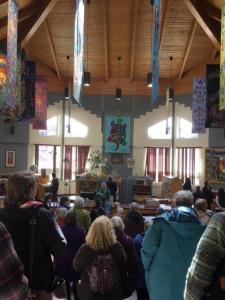
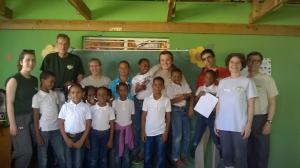



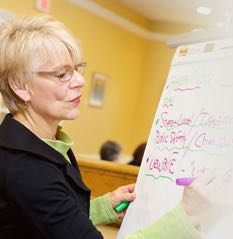



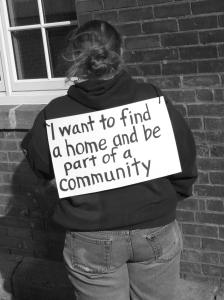

 Estimates are in and the comprehensive Bishopswood septic system will cost $185,000. As Bishop Lane says in his letter to friends of our diocesan camp:
Estimates are in and the comprehensive Bishopswood septic system will cost $185,000. As Bishop Lane says in his letter to friends of our diocesan camp: